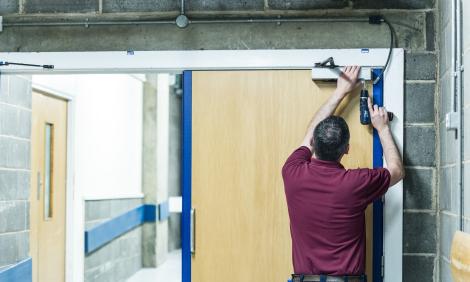Caretaker
Caretakers have a role in the security and maintenance of NHS buildings.
This page has information on the role of a caretaker in the NHS, including entry requirements and skills needed.
Working life
As a caretaker, you may work in a hospital, health centre or headquarters building. Your duties will usually include
- small repairs and maintenance
- disposing of clinical and other waste
- moving furniture and equipment as needed
- calling in skilled maintenance staff for larger repairs
In a smaller building, such as a health centre you may also
- supervise car parks
- maintain the grounds, including sweeping paths and gritting during cold weather
- open and lock the building each day
- test fire and other alarm systems
- take deliveries
Some caretakers may also do cleaning tasks such as those done by domestic assistants. This could include sweeping, dusting, polishing floors (with a polishing machine) and cleaning toilet areas. Some of the work is similar to that of porters.
You may work on one site or look after several sites. You may be expected to drive between sites.
Who will I work with?
In a large building such as a hospital, you might be part of a caretaking team. In a smaller building you may be the only caretaker on site. You will liaise with clinical staff, (eg GPs) and non-clinical staff (eg porters, receptionists and facilities managers) and are likely to have some contact with patients.
Entry requirements
There are no set entry requirements. Employers usually ask for experience of caretaking work. They may ask for knowledge of health and health safety.
It may be an advantage to have relevant qualifications in, for example, cleaning.
You need a good standard of numeracy and literacy. Employers may ask for GCSEs in English and maths.
Employers may ask for a full driving licence.
Skills needed
Caretakers need to be
- willing to do tasks as needed
- physically fit for moving, lifting, bending, etc
- responsible for their own work
- willing to work alone if necessary
- very health and safety aware
- methodical and reliable
- organisational skills
- practical skills
- communication skills
Training and development
When you start work as a caretaker in the NHS, you will get the training you need. This includes health and safety and manual handling. You may be expected to go on short courses on particular topics such as infection control or dealing with hazardous waste.
You may be offered the chance to take qualifications in, for example, cleaning. This could be offered through an apprenticeship.
-
Caretakers working in the NHS are paid on the Agenda for Change (AfC) pay system. You will typically start on AfC band 2. With further training and experience, you could apply for more senior positions with broader responsibilities.
Caretakers in the NHS work standard hours of around 37.5 a week. Some may work shifts including early starts and evenings.
Terms and conditions will usually be different for caretakers working outside of the NHS.
-
With experience, a caretaker could become a team leader supervising other caretaking staff, possibly across several sites. There may be opportunities to move into other estates services roles or into a support role. There are opportunities outside the NHS.
-
Most NHS trusts advertise their vacancies on NHS Jobs. Some advertise on their own websites. You can find a list of NHS organisations on NHS Choices.
If you're applying for a role either directly in the NHS or in an organisation that provides NHS services, you'll be asked to show how you think the NHS values apply in your everyday work.





